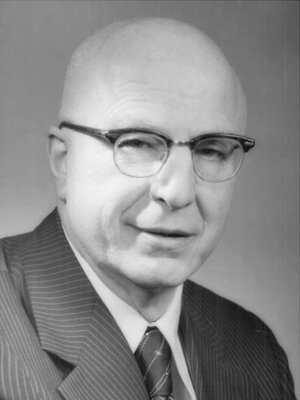
Harry Drickamer Symposium, March 15, 2004
University of Illinois professor emeritus Harry G. Drickamer died Monday May 6, 2002 after suffering a serious stroke. Drickamer held appointments in the departments of chemistry, chemical engineering, and physics. He was born November 19, 1918 in Cleveland, Ohio, and obtained BSE (1941), MS (1942), and PhD (1946) degrees from the University of Michigan. He worked for the Pan American Refining Corporation in Texas City, Texas, from 1942 until 1946, and returned briefly to Michigan for the spring 1946 term to complete his PhD degree. Immediately thereafter he joined the faculty of the Department of Chemistry and Chemical Engineering at the University of Illinois. Drickamer was Head of the Division of Chemical Engineering from 1955-58, and became professor emeritus in 1989.
Drickamer was awarded the National Medal of Science by President George Bush on October 18, 1989. The White House announcement praised Drickamer as a pioneer in the field of pressure tuning spectroscopy "which has contributed greatly to the world's understanding of modern science including chemistry, physics, biochemistry, geology and other disciplines."
The Debye Award of the American Chemical Society cited Drickamer as "a true pioneer in fundamental studies of the physics and chemistry of solids, through highly imaginative use of very high pressures in a wide variety of experiments on solids and through brilliant interpretations of the properties he has discovered."
In 1989, Larry Faulkner was quoted as saying Drickamer was "among the most creative and influential figures in physical chemistry for almost four decades." William R. Schowalter was also quoted as saying "He is a unique individual who has had immeasurable influence for several decades on many of our best PhD candidates in three fields -- chemistry, chemical engineering, and physics. He represents all that we aspire to be."
Drickamer's work led to advances in the understanding of the molecular, atomic, and electronic properties of matter, and provided the tools to study these properties with greater detail and precision. He was the first to use infrared and UV-vis spectroscopy to study matter at high pressure, thereby discovering that high pressure perturbs different types of electronic orbitals to different degrees. He discovered a wide variety of electronic transitions in solids and molecules and the optical, electrical, chemical, and magnetic consequences thereof. He published more than 450 original contributions to the scientific literature. A summary in his own words of his research accomplishments in the field he established, pressure tuning spectroscopy, can be found in Ann. Rev. Mater. Sci. 1990, 20, 1-17.
Drickamer was a member of the National Academy of Sciences, the National Academy of Engineering, the American Philosophical Society, and the American Academy of Arts and Sciences, and was a fellow of the American Physical Society, the American Institute of Chemical Engineers, the American Geophysical Union, the Faraday Division of the Chemical Society, the American Association for the Advancement of Science, and the American Institute of Chemists.
Apart from receiving the National Medal of Science, Drickamer also earned the Welch Prize in Chemistry (1987) of the Robert A. Welch Foundation; the Oliver E. Buckley Solid State Physics Award (1967) of the American Physical Society; the Ipatieff Prize (1956), the Langmuir Award (1974), and the Peter Debye Award (1987) of the American Chemical Society; the Colburn Award (1947), the Alpha Chi Sigma Award (1967), the William H. Walker Award (1972), and the Warren K. Lewis Teaching Award (1986) of the American Institute of Chemical Engineers; the Bendix Research Prize (1968) of the American Society for Engineering Education; the Chemical Pioneers Award (1983) and the Gold Medal (1996) of the American Institute of Chemists; the Michelson-Morley Award (1978) of Case Western Reserve University; the John Scott Award (1984) of the City of Philadelphia; the Eliot Cresson Medal (1988) of the Franklin Institute; the P. W. Bridgman Award (1977) of the International Association for the Advancement of High Pressure Science and Technology; the Outstanding Materials Chemistry Award (1985) of the Department of Energy, and Alexander von Humbolt Award (1986) of the Federal Republic of Germany, and a Doctor of Chemical Sciences degree Honoris Causa (1994) from the Russian Academy of Sciences.
-- Bill Greenough, with additions by Greg Girolami.